This Entrepreneurial Family Is Thriving With Help from a Savings Group
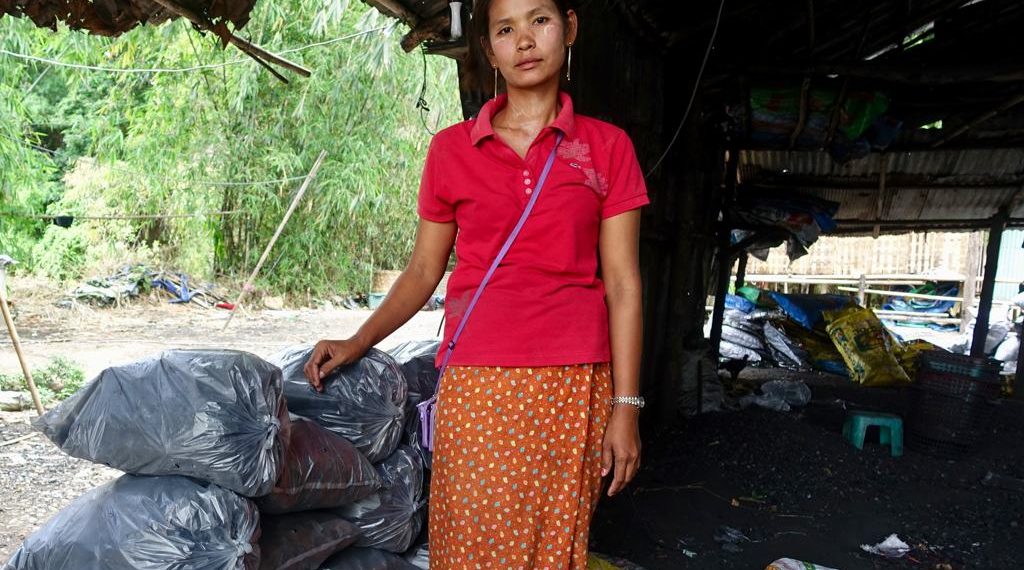
Everyone in Ma Thay’s family owns a business. Her parents run a business, and she and her brothers and sisters all run businesses too. They work every day except Friday.
Ma Thay’s parents sell vegetables and corn that they grow on land that they rent. Her younger brother takes chickens and ducks from Thailand to sell in Myanmar. For every kg he sells, he earns 20Baht profit. Her youngest sister sells Burmese street food. Another sister sells other kinds of food. An older sister lives in Bangkok, works at a factory, and also has a small selling business.
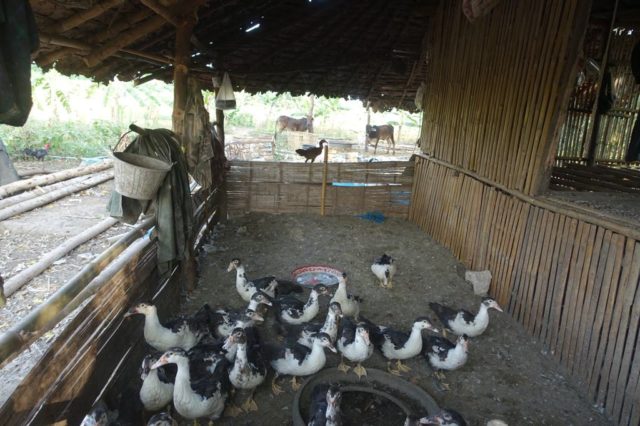
Ducks for sale.
“My mother has always been an entrepreneur. She constantly looks for ways to buy and sell things instead of being a daily farm laborer. “
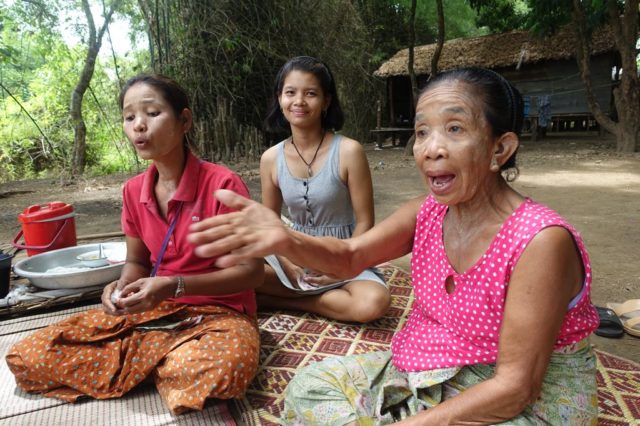
Ma Thay’s mother talks at a Savings Group meeting.
When she was 8 years old, Ma Thay came to Thailand with her family. Myanmar was a difficult place for their family to survive, and her parents chose to move to Mae Sot. They had 5 children. Ma Thay’s youngest sibling was only 8 months old when they chose to move. Their family resettled in a village and there Ma Thay got to go to a migrant school for a time. But a few years after that, her mother did not have enough money to send all 5 children to school. Ma Thay had to quit school to help care for her younger 2 siblings while her parents and older 2 siblings went out to work.
Ma Thay is a member of a VSLA(Village Savings and Loan Association) or savings group which is part of The Charis Project’s Family Enterprise program. With her husband, she runs a business where they purchase cooking charcoal for resale. They also sell the vegetables that her mother grows at markets around town. As migrant workers, they don’t have access to regular banking and loan services. If migrant workers need emergency funds, or capital to expand their business, they need to take out high risk loans from money lenders that charge 20% interest/month. It’s not an easy environment for small business operators to thrive.
Help Give More Families Access to Savings Groups
We sat down with Ma Thay one afternoon after a savings group meeting to learn more about her life. (This interview has been translated from Thai to English.)
Before you joined the savings group how was your business and financial situation?
Before we started the VSLA, we hardly saved. If we saved some, we spent it very quickly when we had needs. When we ran out of money, we borrowed.
Have you ever not been able to pay back the loan?
I was able to pay it back every time. We just had to eat less, spend less, and more carefully manage.
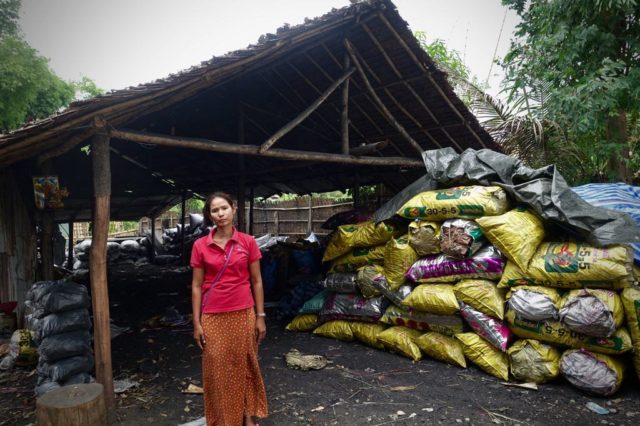
Ma Thay poses with her inventory.
Did you have to pay interest when you borrowed money before joining the savings group?
Yes, the interest is 20%.
How did you pay back loans at that time? Could you make payments?
No, if I borrowed 5,000Baht and was given 5 months to pay back, every month I had to pay 1,000Baht interest and at the end of the 5 months I had to pay 5,000Baht all at once. I ended up paying back double the amount I borrowed. If I didn’t have the money, I had to borrow the money from somewhere else to pay. I could not pay it back a little bit at a time. But at the VSLA, I can pay my loans back a bit at a time so it doesn’t worry me as much as before. I can pay back in small amounts when I can, and then the amount of interest I pay is reduced according to what I still owe.
How did not having money affect the peace in your house?
It caused a lot of stress. Sometimes my husband and I would argue. When we had to reduce the loads of charcoal from 2 loads to 1 load so we could pay off our debt, we had so much less money to cover household expenses. It was very hard to manage.
Help Give More Families Access to Savings Groups
Did the financial stress affect your parenting?
No matter how stressed we are, we take care of our children the same. We are afraid that they will not have an education. We don’t want them to have a difficult life like we do.
Did you ever consider taking your children out of school when it became difficult to pay for it?
No. Never. School for my daughter is a big priority for me. I never thought about taking her out of school. I thought, “We must keep fighting for it.” Even if it required me or my husband to find another job. We would look for solutions and not give up.
When did you start your business?
Many years ago. When I was 15-16, I used to work as a day worker on a farm. But since I had my own family, I stopped working as a laborer. We switched to doing our own thing instead. Through selling things we can make more money than as day laborers.
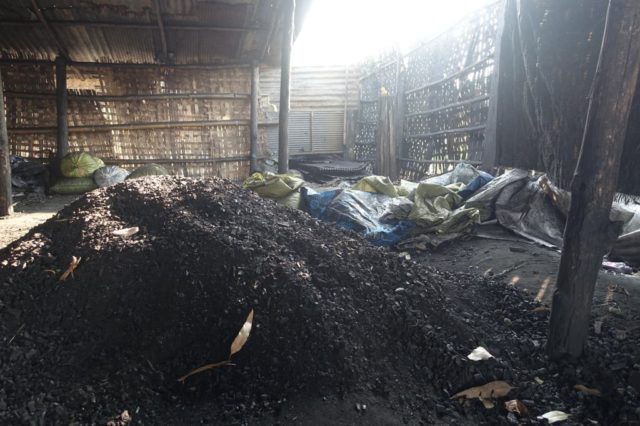
Ma Thay puts the charcoal into smaller bags for selling at the markets.
What inspired you to start your own business?
It pays better. Daily labor work pays around 150Baht/day($5USD), while running a business could pay 200-300Baht/day($6-$10USD). Also, there is no guarantee that I can work every day as a day laborer. In some seasons there is no work available at all. With a business, I have the chance to earn every day.
Did you have to learn how to start a business and business skills when you started?
Not really. When I lived with my mother, she always sold something. She never hired out as a daily laborer. My dad would plant vegetables and she would sell the produce: vegetables and also chicken. In the past, there was no weekly market so we would only sell the produce in our neighborhood. Now there are weekly markets so we all set up our shops at the markets. With more markets, we can earn more.
How did you start saving with the VSLA?
Seyama(teacher) Ching San came to our village and gave us a training about saving and Village Savings and Loan Associations. She suggested that each of us save 50b every week. If we do that, at the end of the year we will have 2,000-3,000b($60-$100USD) that we can spend on what is important to us, such as visiting our family in Myanmar. We listened and thought through it together. We liked the idea a lot. We knew it would be helpful for us. So we agreed together to do it.
Did you see any differences/changes after starting the VSLA?
Things have gotten better. When I don’t have enough to keep my business running, I can borrow from the group. I can pay back the loan bit by bit. I can pay what I can, and pay the rest later. The savings I put in the box though, I cannot take out whenever I want. It stays there until the end of the savings cycle. It is a decision to save. You put it in and it will be kept there.
I am more careful with my spending now. I always keep in mind that, no matter what, every 2 weeks I have to set apart at least 50 to 100baht to put in the savings box. I now plan ahead of time how much I want to save at the next meeting – 200 or 300. Without the group, we would never start to think this way.
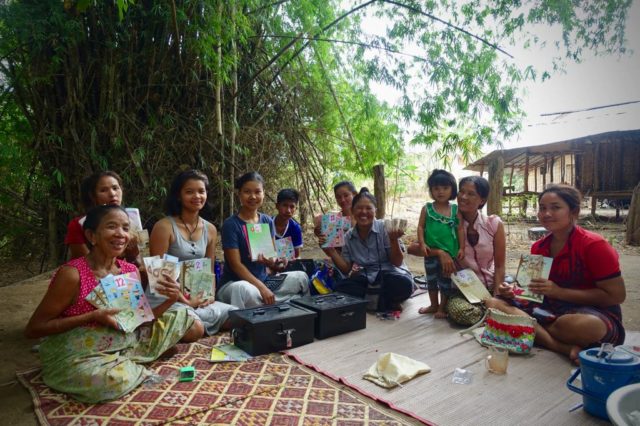
Pay out day at the savings group. Everyone gets back their savings, and their profit.
You were selling charcoal before you joined the VSLA. How does the VSLA help you improve your business?
My business got better. In the past, I would buy about 1-2 car loads of charcoal. One load is 80 big bags of charcoal and costs 10,000B($330USD). When I wanted a few thousand baht more to be able to get 2 car loads, I would have to borrow from a loan lender. Now I have more money to circulate in my business. I have enough for 2 car loads and more. I can borrow some money from the group so I can buy 3 car loads. Because it’s easier to manage the money/capital, I have less worries. The best part is when I borrowed from outside the group, the interest I paid just went to my lender and all belonged to him. But within the group, we will get the savings and the interest back within 1 year!
How much profit do you get from selling charcoal?
The cost of 1 load is 10,000Baht($330USD), I would get 12,000Baht($400) from selling. So now that I can sell 3 loads, I would get 6,000Baht(~$200USD) profit.
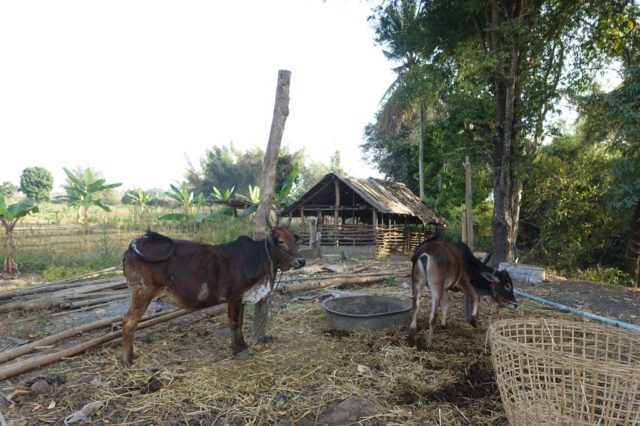
These calves are an investment. They will sell or eat the meat when they are grown.
When the VSLA savings and profit were shared out, what did you spend it on?
I divided it into 2 parts: With the bigger part I bought more charcoal. With the smaller part I bought gold to keep. (A common way that Burmese women save for emergencies is to buy gold jewelry.)
How is the VSLA helping you with supporting education for your children?
It makes it easier. There are several expenses in sending children to school – books, school fees, snacks, and the list goes on. VSLA helps me to have more money to run my business so I have more income to pay for the schooling expenses.
Help Give More Families Access to Savings Groups
What do you usually do with the money you borrow from the group?
I buy charcoal and other things to sell at weekly markets.
What do your mom and dad do with the money they borrow from the group?
They borrow money from the group to buy more seeds, fertilizers, etc.
Now they do more than they did before. For example, in the past their capital was limited, so for planting corn they would do it small and all by themselves, or we helped them. Now when they get their money at the end of the savings cycle, they expand the area they plant and can borrow money from the group to hire some people to help. In the past we planted 2 fields, now we plant 4 fields.
Mainly my mom would borrow for planting and then use the profit from selling to improve other things, like the barns. She rents 22 rais of land (~10 acres) for 15,000b($500USD) annually. She plants rice, vegetables, beans, bananas, and corn.
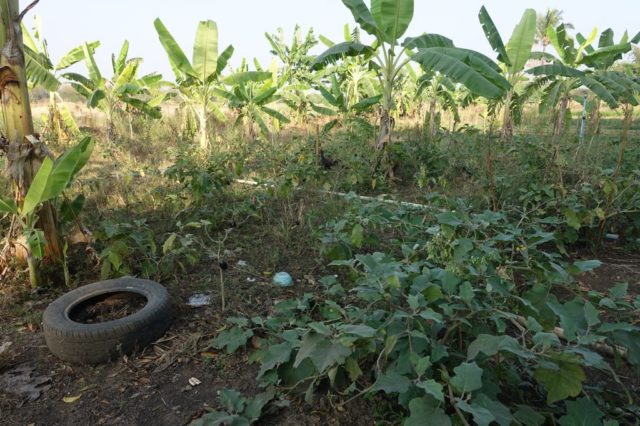
Some of the vegetables and bananas her mother grows to sell.
Now, because she saves, when she is sick, my mom doesn’t have to worry as much as before. She has money to go to the hospital.
“Life was hard for my mom and dad raising 5 kids, but they never thought of abandoning us. They worked hard, and harder when they needed to. We always had enough food to eat, enough clothes to wear, never had to be ashamed of being their children. We just weren’t rich.”
Thanks to the strong entrepreneurial example set by her parents, and access to savings and loan services, Ma Thay’s whole family is thriving and becoming stronger, together.
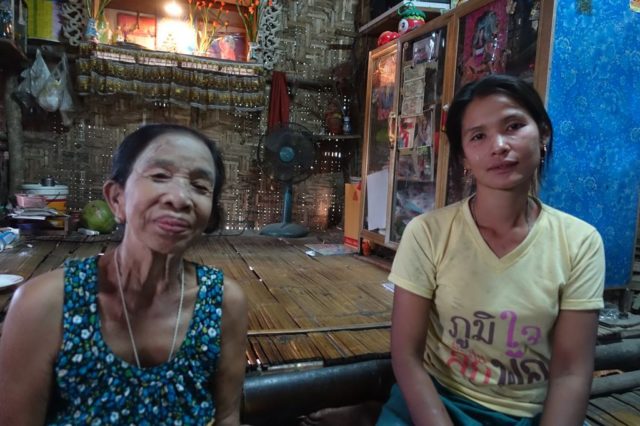
Ma Thay and her mother sit together in her home.
Help Give More Families Access to Savings Groups
Carrien is co-founder of The Charis Project, Family Education Curriculum Developer, and mom of 6.
You can get her free mini-course on Making Your Family More Resilient here.
